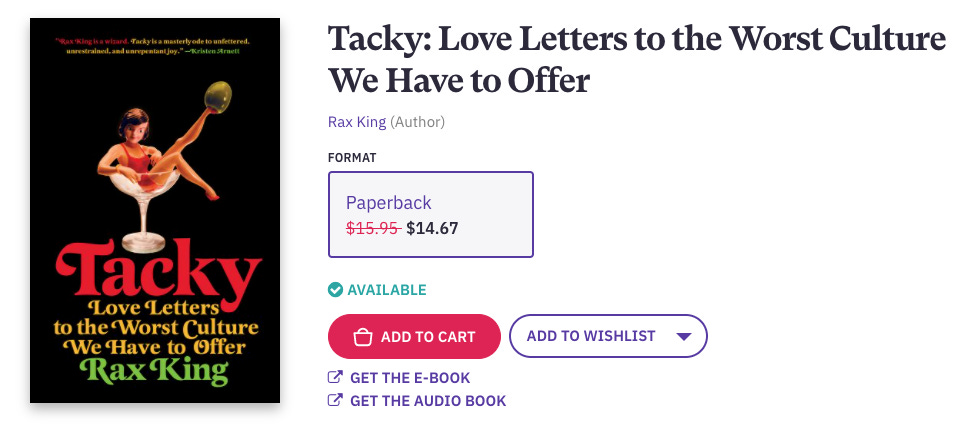You know how Guy Fieri was in that hard soda Super Bowl commercial last month and it felt like a real moment of triumph in his decades-long career of celebrating joyful consumption driven by passion and flavor, rather than conspicuous consumption driven by class anxiety and social signals? Let’s talk about that.
Today on The Fingers Podcast I’ve got an interview with podcaster and writer Rax King, author of Tacky: Love Letters to the Worst Culture We Have to Offer. I first came across Rax’s podcast, Low Culture Boil, while conducting research about bachelorette parties for a fiction project I’ve been working on. The episode she and her cohosts did on “penisphernalia”—the various phallic Etsy knick-knackery that has become a visual hallmark of the modern hen party—is hilarious, thoughtful, and provocative in equal measure. I wanted more, so I subscribed to LCB and picked up Rax’s book, Tacky. Every essay in the collection is a banger, but when I read her brilliant, vulnerable piece diagnosing her unironic love for the Mayor of Flavortown, I knew I had to get her on The Fingers Podcast.
🎧 Paying subscribers can listen to this full-length interview on The Fingers Podcast
To unlock the transcript and full-length audio of this interview, plus all other Fingers Podcast episodes and more, buy a subscription today!
After some back and forth, we recorded this episode in mid-February 2022. During our conversation, I pitched Rax on the similarities between the nu metal act Creed (which she loves) and hard seltzer (which she seems to like); got her take on consumer power vs. worker power; relived her harrowing taste-test of bootleg Campbell’s Brothtails; and much more. Naturally, we talked Fieri, too. It was a terrific conversation, and I hope you enjoy it.
Editor’s note: This transcript has been edited and condensed. The full-length interview is available on The Fingers Podcast for paying subscribers, who can access the episode via private RSS feed using these instructions (it takes a minute, and you only have to do it once.) And if you haven’t yet, consider buying a subscription now!
Meet Rax King, writer/podcaster and author of Tacky
Dave Infante, Fingers: Okay, Rax King! Welcome to The Fingers Podcast. How are you?
Rax King, writer/podcaster and author of Tacky: I’m doing good, thank you for having me.
Rax, for our listeners who aren't familiar with your work, can you give us a working definition of tackiness and your relationship to tackiness as an aesthetic?
Sure, for anyone who's not familiar with me, my book is a collection of personal essays, each one centered around a different piece of pop culture that is both near to my heart and more broadly considered tacky or trashy. I think at this point I have come up with a working definition of tackiness, which is that it's like campiness, but it's too embarrassed and self-aware, to lean in that far. With something that's campy, I think a generally recognized definition is “so bad, it's good.” You can consume this thing and have a privately fun experience of it that isn't the same as the experience the creator wanted you to have. Whereas if something is tacky, not only are you not having the experience the creator wanted you to have, you're uncomfortable and embarrassed and self-conscious to be consuming something like this.
What do you get from tacky stuff? You personally?
I mean it is a very personal experience. It’s not like I think that if more people would just shut up and enjoy their fast food that's going to change the world. But I do think that you stand to teach yourself something about self-confidence and self-assurance and maybe trusting yourself. And trusting also, that these things don't matter that much. It really doesn't matter, if you like to get down to nu-metal still, which I certainly do. Who cares?
You’ve stuck your flag in the sand there: you are a self-avowed and proud Creed fan.
I am! I am. I feel like I've changed some minds there. I get a lot of DMs from people who are like, “Hey, actually Creed's kind of good.” And I'm like, Yeah, they're kind of good. They're exactly kind of good. It's fine.
When I read your essay on Creed, who was, to your point, contemporarily successful, I I saw a parallel between that and what we kind of saw with the rise of hard seltzer and flavored malt beverages more recently. In 2018 or so when White Claw really first started coming onto the scene, it was shunned as a drink “for chicks.” First it was stigmatized, and then all of a sudden, it became normalized and was no longer an embarrassing thing to drink. Anyway, I'm curious to know how you think about the cultural tackiness or the cultural cachet of different categories of alcoholic beverage.
With alcohol, it seems like the the barometer shifts really, really quickly. Because I do remember a time when something like PBR would have been derided by people in my general cultural milieu as piss beer. Like, it doesn't taste good, it's cheap, it’s for people who don't have enough money. That was the attitude. Then, in the early 2010s, that that shifted completely. All of a sudden, PBR was the cool beer because it was cheap, and because it had these associations with working-class, blue-collar type guys.
There was some blue-collar stolen valor going on there. People wanted to pretend they were just getting off the shift at the mill, but they had like a $350 iPhone in their pocket.
Yeah. When I was first in high school, that beer was at every party just because it was what we could get people to buy for us in big quantities. When I was in college, it was at every party, but because it was the cool beer now. I was like, It still tastes exactly the same. Nothing's changed. I still don't like it. You know, I'm not a huge beer lover. I'm a beer drinker. But uh, you know, [PBR] wasn't something where I would ever have sought it out because of its taste.
It was just that at that point, it was still what I could afford. But I was going to college with these astronomically wealthy people who did not need to be slumming it with PBR. For me it was a source of shame that it was all I could afford. I see something kind of similar with hard seltzer, with White Claw in particular, because the the version of White Claw such as it is that I remember from when I was growing up is something like Mike's Hard Lemonade or Smirnoff Ice. In terms of the actual drinks themselves, not that much has changed.
Now that craft beer is less popular, people just see it as corny and pretentious. At least it used to have cachet.
I did an episode of Low Culture Boil about hard seltzer recently, and one interesting thing that came up in our research was that a lot of brewers really hate hard seltzer not for any cultural reasons, but because its preparation is so sterile and anodyne. It's very sterile and almost medical in the way that you make it. But for me, White Claw just kind of tastes good. It’s a relief for me to have something that gets me about as drunk as PBR, which is to say, like, slowly in the course of many hours, but it tastes better. That's the only reason I care about it.
Hard seltzer is a commodity consumer packaged good. Craft beer is not that. Is tackiness always aligned with commodity products? Or is it can it be associated with artisanal craft products?















